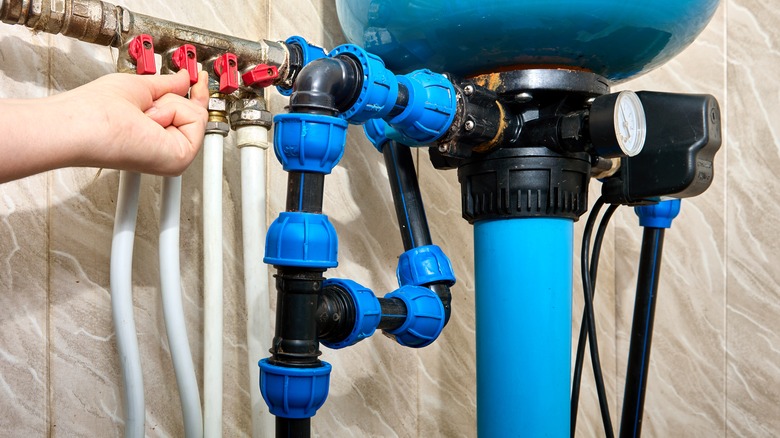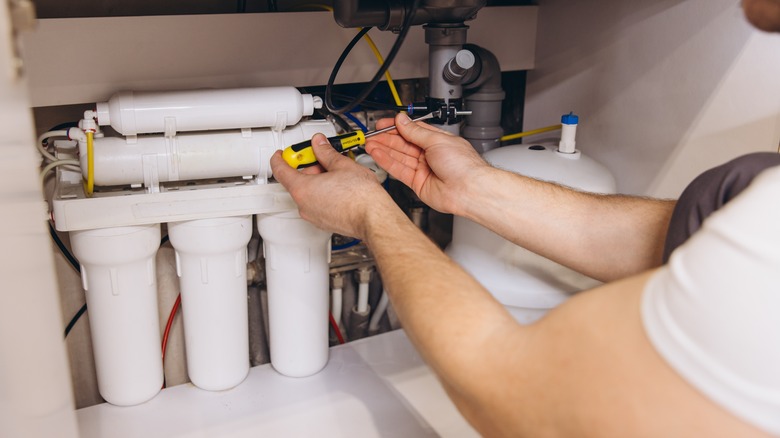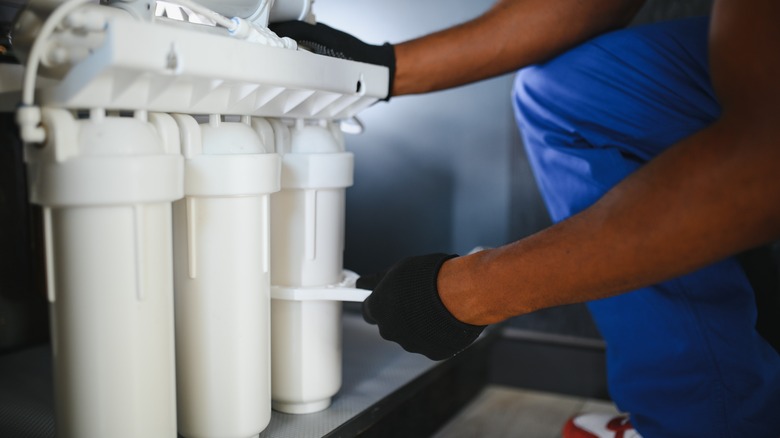Are Whole-Home Water Filtration Systems A Good Way To Save Money Or Just A Waste?
Is your tap water accompanied by a strange smell or an unpleasant taste? Has your skin been acting up? Or maybe your appliances and pipes seem to constantly need maintenance work? Many homeowners who encounter these problems end up installing a whole-house water filtration system. But with a high upfront cost of thousands of dollars, it's crucial to get your water tested for specific quality issues before splurging on a multi-stage filtration setup. If it turns out that you already have high water quality at home, an all-encompassing system would be superfluous and a waste of your money, as it likely wouldn't make a significant difference in your water post-installation.
Start by looking into whether your plumbing runs on municipal or well water, and if the water in your area tends to be hard or soft. Well water can contain higher levels of contaminants, including arsenic in some cases, so whole-home filtration systems are often most beneficial for residences that run on well water. This can save you money in the long run, as sediment from unfiltered water can reduce your water heater's efficiency, shorten its lifespan, and clog your faucets. If the water in your area tends to be hard, a water softener could also save you money, as soft water is better for appliance and plumbing health.
If you're just experiencing minor issues with your drinking water, a single-purpose filter at the kitchen sink could be a better and much more affordable investment. Should you decide to install a whole-house water filtration system, it's worth noting that some manufacturers offer financing options to minimize the upfront cost.
The different types of whole-home water filters
Once you dive into your search for the ideal whole-home water filtration system, you'll quickly realize how many types of filters are out there. Each provides effective ways to purify your household water, but not every filter is needed in every home. Some of the filtration stages you'll likely come across include sediment filters, which get rid of dirt, rust, and other large particles; carbon filters, which remove bad tastes and odors caused by chlorine and algae; water softeners, which prevent the havoc hard water can wreak on appliances and plumbing; and UV light filters, which inactivate waterborne germs, bacteria, and viruses.
You'll also likely encounter reverse osmosis systems, which remove most common contaminants. While reverse osmosis systems are sometimes listed as a type of whole-house system, they are primarily filters for drinking water, installed at the kitchen sink. Attempting to install reverse osmosis throughout the entire home would be costly, wasteful, and simply unnecessary. It's also worth noting that reverse osmosis removes beneficial minerals along with the bad stuff, many of which are important for bone and tooth health.
This variety of filtering options can seem overwhelming, and it's easy to think your home needs all of them. Instead of splurging on unnecessary filters, check the Environmental Protection Agency for what's likely present in your water, and then order an at-home water testing kit or a water quality test from a certified lab. Avoid tests tied to manufacturers and retailers, as they have a commercial interest in the results. Once you know what your water filtering needs are, compare a few different quotes to avoid getting overcharged.
The cons of a whole-house water filtration system
Homeowners generally report noticing a difference in their water after installing a whole-home water filtration system, especially when it comes to the taste and smell of drinking water and certain skin improvements. However, installing such an extensive system does have its downsides, and a major one is the routine maintenance required. This maintenance could be as frequent as monthly, depending on the system installed. Among other hidden downsides to water softeners, they require this monthly maintenance frequency.
Having said that, well-maintained water filters can go a long way toward keeping your appliances and plumbing in good shape, which could minimize maintenance in other areas of the house. If you feel that low water quality is impacting not only your health but also that of your home, installing a whole-house water filtration system can be a good way to save money on those pesky repairs in the long run. Should you find a whole-home system superfluous, consider a simple under-sink water filter for better-tasting drinking water instead.


